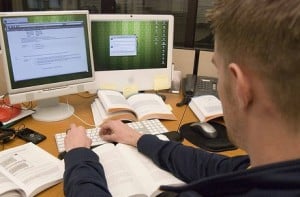Don’t compromise on cheating
Professors must fight plagiarism, even when it’s hard
Photo courtesy of Mr_Stein on Flickr
Share

The decision of Panagiotis Ipeirotis to no longer pursue plagiarism might seem notable in that a professor would give up on catching cheaters. But to those inside the academy, his announcement merely gives a public face to an alarmingly common sentiment.
Students cheat, and any professor with more than a few years experience can tell you stories that would make you laugh. Then weep. Every case of plagiarism makes you feel sick. You are not only not getting through to your students, but it’s as though they don’t care enough to even want you to get through.
So the feelings of Professor Ipeirotis are entirely understandable, and shared, I’m sure, by thousands. They must, nevertheless, be resisted.
The NYU prof has complained publicly that his efforts to catch cheaters made his job harder: “There was a very different dynamic in class, which I did not particularly enjoy.” Oh well, then, by all means, professor, please only stick to what you particularly enjoy. Any bets on how long a university could function with all of its staff doing only what they particularly enjoy?
Simply put, a certain level of diligence is necessary to assure the academic integrity of the assignment, the course for which it is required, the degree to which that course is applied, and the university which grants the degree. If Ipeirotis thinks he was denied part of his raise for being tough, then his problem is with his administration. If he compromises on cheating, he’s part of the problem.
But what about the professor’s idea of winning the cold war by structuring courses and assignments so that cheating is impossible? Isn’t that a better solution?
Not really. As Ipeirotis concedes, some students will cheat if at all possible, and it’s almost always possible. One year I had students submit an essay proposal, then an outline, and then the actual paper so I could follow them through the process and make sure they were not just getting a paper from the internet. Except that some students started with a paper from the internet and then reverse engineered a proposal and outline. You can give students very specific assignments, but suppose a student hands in a paper way off topic? That’s a big red flag and you have to check it out. And even if it’s spot on, there’s no guarantee that he didn’t pay someone to do it for him. And what if two students hand in identical work?
The only real way to ensure students are not cheating is to watch them every minute they are working on their assignments, but that introduces a new and even bigger problem. In-class assignments and presentations take up valuable time that could be given to instruction and discussion. In any case, there are assignments that can’t be done properly in class time. In many disciplines students have to spend time outside of class doing their work or they are not doing the discipline they are supposed to be doing. Chemistry without lab reports is not chemistry and English without essays is not English.
This is not to say we should do nothing. We should explain plagiarism properly, and we should punish it judiciously, and, yes, we should look for innovative ways to structure assignments.
But we can’t compromise where it really matters.